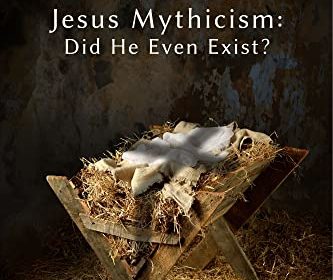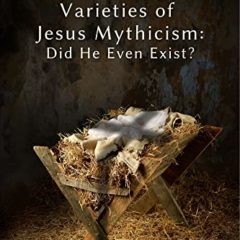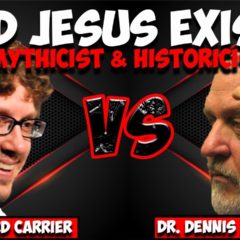List of Historians Who Take Mythicism Seriously (by Richard Carrier)
There are legitimate reasons to doubt Jesus existed, even as a mundane man whose legend became exaggerated (which is, definitely, always plausible too). These reasons have survived peer review—twice. And yet a common fallacy deployed against this fact is that “no relevant experts take this seriously.” This is already a fallacy. Once there is a multiply-corroborated peer-reviewed challenge to a consensus, that means it’s substantial enough that the consensus needs to be re-examined on the new evidence and analysis presented. It might survive that examination. But you still have to do it. You can’t just say “no one takes it seriously” as an excuse to not even conduct that examination (see my remarks on this in What I Said at the Brea Conference). Nevertheless, here I will dispatch the mere premise of this argument, the claim that “no one takes it seriously.” I will maintain here an ongoing list of all those bona fide exerts—scholars with actual and relevant PhDs (many of them even sitting or emeritus professors of the subject)—who do take it seriously. I previously had maintained this list in response to Bart Ehrman’s deployment of this fallacy. But the number of scholars who meet even his absurdly narrow criteria—and even more so any genuinely pertinent criteria—has grown so large it needs its own page now. So here it is. In the following list I present in bold text those historians who either doubt the historicity of Jesus or have admitted to being agnostic about it (as in, they are unsure whether he existed or not). All the other scholars listed are convinced Jesus existed—they still don’t think “Mythicism” is probable (the idea that Jesus is entirely, and not just partially, mythical)—but they have gone on record admitting that at least some theories of the origin of Christianity without a real Jesus can be plausible enough that the debate is worth taking seriously, and not just dismissed out of hand as crackpot. Thomas Brodie. A now-retired professor of biblical studies who confessed his doubts in Beyond the Quest for the Historical Jesus: Memoir of a Discovery (Sheffield Phoenix 2012); see my discussion in Historicity News and Brodie on Jesus.Richard Carrier (myself). An independent scholar with a PhD in ancient history from Columbia University and multiple peer-reviewed publications, including the academic study On the Historicity of Jesus: Why We Might Have Reasons for Doubt (Sheffield Phoenix 2014). My colloquial summary, Jesus from Outer Space, outlines in simple terms the underlying logic of that peer-reviewed study. My anthology Hitler Homer Bible Christ includes all my pertinent peer-reviewed journal articles up to 2014. And my study of the methodology, which was peer-reviewed by professors of both mathematics and biblical studies (a requirement I set in my contract), is Proving History: Bayes’s Theorem and the Quest for the Historical Jesus (Prometheus 2012).Raphael Lataster....
Varieties of Jesus Mythicism
In the newly published volume — Varieties of Jesus Mythicism: Did He Even Exist? — you will find that the two closing chapters were written by Neil and me. Neil’s essay, entitled “A Rejoinder to James McGrath’s Case for Jesus” forms the penultimate chapter. Mine, “‘Everything Is Wrong with This’: The Legacy of Maurice Casey,” come in last. Our essays don’t necessarily advocate for mythicism (in any of its varieties), but instead, focus on the mistakes people have made and continue to make when arguing for the historicity of Jesus. We’ll have more to say about it in the future. But for now, if you’re interested, the book is available at Amazon or Barnes & Noble....
Should We Assume Jesus Was Historical? The Mythvision Carrier-McDonald Debate
Dennis MacDonald and I have discussed the question of Jesus’s historicity many times over the years. These are among the most important kinds of discussions to have, as MacDonald isn’t a Christian apologist and actually agrees the Gospels are almost entirely mythographical and not works of history. So we can cut past most of the baloney and get right to brass tacks: what really can we say about a historical Jesus when all we have about him is mythology and theology? I have written about this before: in Historicity News, regarding MacDonald’s brief discussion of the historicity question in his book Two Shipwrecked Gospels; and analyzing our first debate on the PineCreek channel in Is Jesus Wholly or Only Partly a Myth? The Carrier-MacDonald Exchange. And now, recently, we engaged in a reprise on the Mythvision channel in Did Jesus Exist: Dr. Richard Carrier vs. Dr. Dennis R. MacDonald – Mythicist vs Historicist. By Richard Carrier, PhD MacDonald maintains historicity in spite of his (unwarrantedly controversial) minimalist stance on the Gospels—a stance that, IMO, is substantially correct; not only in his identification of Evangelical transvaluation of Greco-Roman literature, but also his notion of the same with respect to the Greco-Jewish Septuagint. I don’t agree with every detail or instance of his claims in these regards, but I am sure he is right on the overall model of what the Gospel authors were doing: taking story models from both the Jewish scriptures and pagan literature and “rewriting them” into “better” stories about Jesus, with the intent of culturally replacing them. We both agree the Gospels are fundamentally mythical texts (see my demonstration of this in Chapter 10 of On the Historicity of Jesus). So how can MacDonald be so sure there even was a Jesus? What makes Jesus more arguably historical than any other mythical hero, from Moses to Osiris to Hercules? That’s what we talked about, and our discussion ranged across both factual questions as well as methodological. All of it interesting. Part One: Gnosticism? After I summarized my position, MacDonald launched the discussion with a question (near the end of minute 17): “What [do] you understood to have happened, in the Pauline context, of what you call ‘the revelatory Jesus’ and [do] you find any support for that view in the Christian Gnostic texts?” I more or less answered that I do not believe Gnosticism was ever really a thing (see Gnosticism Didn’t Exist), and I use none of their texts in my analysis in OHJ because they are all late and derivative (even the Ascension of Isaiah, should one even consider that “Gnostic” in some sense, though in its earliest likely redaction a rare case of an actually independent text, barely featured in my probability calculations); and that the...
Is Jesus Wholly or Only Partly a Myth? The Carrier-MacDonald Exchange
Last year Dennis MacDonald and I had a moderated conversation on the PineCreek channel regarding the plausibility of Jesus never really being a person in history. MacDonald is famous for proposing the Gospels construct myths about Jesus partly from Homeric and other Gentile models, and partly from Jewish Old Testament models. His Homeric Epics and the Gospel of Mark is still an enduring classic. His equally important work on the Septuagint parallels is the lesser known Two Shipwrecked Gospels. But his latest survey of both features in constructing the mythology of Jesus is Mythologizing Jesus: From Jewish Teacher to Epic Hero. By Richard Carrier In all of this MacDonald is a minimalist but not a mythicist. He believes almost everything said about Jesus in the Gospels is mythical. But he also believes there is some, albeit scant, data supporting some sort of real historical Jesus. I’ve addressed his case for that before. But on PineCreek we got to go into more depth about it. Following is a partial transcript and commentary. I did not vet the transcript—it was provided by a reliable colleague—but it should be accurate enough. Though if anyone catches any errors in it, do let me know and I’ll correct them here. Some things in it have also been edited for this medium, for flow and clarity. MacDonald’s Opening Dennis speaking: [N]either of us is a theist, but we do have different attitudes toward the historical Jesus. We’re both historians. I do not call myself an atheist. I call myself rather “a frequently outraged Christian humanist.” And I own all of those. I’m not always outraged. I’m usually outraged. I understand myself to be in the Christian tradition and Christian discourse, and I own that, but I also am a humanist and I don’t make any claims of revelation, or special divine inspiration for my worldview. But it’s something that sustains me and I’m proud to be identified with that tradition and would say that often, but not often enough, the Christian discourse produces things that are good for human life. I would say the same thing about Buddhism and Islam and Judaism, and so that’s where I would locate myself. So the issue is…not whether [there is a God] but rather [the historical Jesus]. I do believe in the historical Jesus, that there was a Jesus. But not because of the depiction of him in the New Testament directly. As I’ve tried to show…that the Gospels…are all derivative of earlier traditions and all have been heavily mythologized, in order to make Jesus competitive in the religious world of antiquity, which Richard [Carrier] has studied as much as I have. And so that Jesus variously competes with Dionysus,...
Prof. “Errorman” and the non-Christian sources — Part 2: Pliny’s Letter
2. Pliny the Younger The mountains are in labor, a ridiculous mouse will be brought forth. (Horace, The Art of Poetry) Ehrman goes to great lengths to introduce us to the sources which, in his opinion, reliably attest to the existence of a historical Jesus. To quote Horace, “Parturiunt montes, nascetur ridiculus mus.” Before the curtain finally opens and reveals a considerable number of Jesus witnesses to the curious gaze of the reader, a series of preliminaries and fundamental methodological considerations must be made. What we learn in the relevant chapters about the value and worthlessness of historical sources is indeed informative, but will have little new to offer to all those who have attended a historical proseminar once in their lives. Be that as it may, Ehrman advocates good and healthy principles, such as that multiple testimonies please the heart of the historian, or that “disinterested” and independent sources deserve preference over others, etc. (p. 41) – one only wished that he himself would also give them due consideration in the later sections. In a section on sources that we do not have, he also admits that we do not have authentic illustrations of Jesus, nor scriptures written by himself, nor eyewitness accounts (p. 49). [3] Hurtado 2007, pp. 2-3: “If correctly dated to about 200, the Aberkio inscription (found in Hierapolis) remains perhaps our oldest identifiable Christian inscription. Although in some older publications one finds certain references to the catacombs and catacomb art of the second century, it is now generally accepted among experts that these too should probably be dated to sometime in the third century”. [4] Theißen, Merz 1997, p. 160f. All that can be said about it is that it is possibly the site visited by the Spanish pilgrim Egeria sometime between 381-384 AD, which has been given as the house of Peter since Constantinian times. Everything else is conjecture and belongs at best in a travel guide, but not in a serious scientific work. Vridar note: see [3] Hurtado 2006 and [4] Theissen & Merz 1998 This is all well and good but could be further elaborated when applied to specific cases, which Ehrman certainly does not feel is necessary. Ehrman could have taken the trouble to make clear to the reader the full extent of the difficulties in which the defenders of Jesus’ historicity find themselves when they refer to external witnesses. For example, it is correct that no authentic images of Jesus have been handed down. But far more interesting is that the type of Jesus in the portraits we possess almost completely resembles the portraits of other late antique healers, so that archaeologists even today...
Prof. “Errorman” and the non-Christian sources — Part 1 of Hermann Detering’s review
The following translation of Hermann Detering’s review of Bart Ehrman’s Did Jesus Exist? has been sent to me and I am thrilled to be able to make it available on this blog. It is over 7000 words, too long, I think, for a blog post, so I am posting here just the first part of the review. The rest to follow. I have modified the translation in a few places to make it flow easier and to iron out some obscurities. I have also replaced the English translation of Detering’s German language quotes of Ehrman’s words with the original English versions. All hyperlinks and notes in the “*see also” inset box are my additions, as also are the images. Endnotes are Detering’s, of course, and I have relocated these in other inset boxes, too. Hermann Detering (1953-2018) Prof. “Errorman” and the non-Christian sources 1. Bart Ehrman’s book, Did Jesus exist? The introduction to the book ushers us into the following scene: Bart D. Ehrman, PhD, Distinguished Professor at the University of North Carolina at Chapel Hill, actually wanted to write a completely different, more important work, namely about how a Jewish end-time prophet named Jesus became a divine being or God. But then he was startled by some emails. He suddenly found himself taken up by a scene that was apparently unknown to him until then: Mythicists who appealed to his authority for their claim that there had been no Jesus! Reason enough for a conscientious “New Testament scholar” to take a closer look at the matter. Although Ehrman had by then read “thousands of books about Jesus in English and other European languages, the New Testament and early Christianity,” he was “like most colleagues completely unaware of the extent of sceptical literature [on the subject]” (p. 2). For a professor of theology and biblical scholar who should be up to date and in daily conversation with his students, this long phase of ignorance is astonishing enough, especially since the question of the historical existence of the man from Nazareth must have occurred again and again in the mass of Jesus literature he read. For example, in The Quest of the Historical Jesus by Albert Schweitzer, often quoted by Ehrman, in which this very subject is dealt with on many hundreds of book pages. This book and others should at least have curbed Ehrman’s boundless surprise and shown him that the question “Did Jesus exist?” is not an entirely fanciful one, and that New Testament research has been periodically occupied with it. Moreover, it is not just since yesterday that the question has been on the agenda of those American “humanists” who read his...










